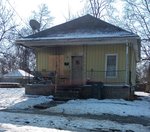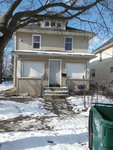

(This story has been updated to clarify the relationship between a property's market value and its valuation for tax purposes. The story reported that the house at 1135 Farrand St. in Lansing was valued for property taxes at $39,100 and sold for $68,000. The updated version adds that in Michigan the tax value is half of the market value.)
Behind the heavy metal screen door, the sounds of excited children could be heard. The woman who answered the door Sunday asked to get her husband. Soon, Madi Mahamat Ibrahim was sliding on white loafers across the front porch at 1135 Farrand St. on the city’s northeast side.
The house is one on a list of 180 red-tagged residential properties in the 1st Ward. Red-tagged properties have been deemed by the city to be unsafe to enter or live in.
First Ward Councilman Ryan Kost, who took office in January, said he obtained the list of them from the city, then began visiting them. By Sunday evening, he had visited all the properties on the list and had identified 47 as being occupied. That means people are illegally living in 26 percent of the unsafe properties in the ward.
Kost said he identified them as inhabited based on noises, pets and lights on in the properties. He noted that, as with Ibrahim’s property, from the street you would not have known the properties were red-tagged because the city stickers had been removed.
Scott Bean, a spokesperson for Mayor Andy Schor, said that while it is illegal to live in or rent out a red-tagged property, the city’s hands are tied.
Code compliance officials can’t remove someone from a property, he said. On top of that, even if the Lansing Police come, the residents may hide or refuse to answer the door. Lansing Police “can’t force their way in,” he said.
Bean noted that the city can charge a landlord or property owner $500 for allowing a red-tagged property to be inhabited.
In order to address the ongoing housing concerns, Bean said the administration is open to a thorough review of city ordinances.
Ibrahim had been renting the 1135 Farrand house for $1,200 a month for two years. In November, Mohammad Abduljaber, representing the owner Zaheih Atrash, offered to sell the two-story home to him on a land contract. The deal lowered his monthly house payment by $400 a month. A land contract is an alternative to a conventional mortgage through a bank. Instead, under a land contract the buyer pays the seller directly until the purchase price is paid in full.
The city shows Ibrahim is paying $68,000 for the property, which is valued for taxes at $39,100. In Michigan, a property's tax value is pegged at half of what the tax assessor determines is the property's market value. It’s been red-tagged since 2017.
Abduljaber owned the property in 2014, but he signed it over to another property owner before heading to federal prison for convictions related to a Medicare fraud scheme with his former wife, Shannon Wiggins, then a medical doctor. In a plea deal, he served three and half years.
Both Ibrahim and Abduljaber said they were unaware the property had been red-tagged since 2017. “As soon as we knew, we went down and got the permits,” Abduljaber said in a phone call Sunday with this reporter and Ibrahim.
Building Department records show electrical and mechanical permits were requested on Jan. 28 but that they had yet to be paid for. The property ought to have been accumulating $150 a month in red-tag monitoring fees since the spring of 2018. That’s when the property moved into an urgent safety concern under city rules.
No fees were charged, according to city records.
The home has been boarded up by the city three times — in 2017, 2018 and again in 2019.
The issue of red-tagged housing and people living in those properties drew renewed scrutiny after a Feb.1 fire destroyed the bungalow at 810 Beulah St. on the near south side the Fabulous Acres neighborhood. The couple who lived there and their dog were on a walk. When they returned, the home was ablaze.
“That couple was very lucky,” Lansing City Council President Wood said. “That fire could have happened in the middle of the night, and we don’t know if they would have made it out then.”
Wood said that people living in a red-tagged property is a “tragedy waiting to happen.” Her colleagues Kost and Third Ward Councilman Adam Hussain concurred.
“The system is broken,” said Kost. “This is exploiting people’s lives. Carol hit the nail on the head that this is a tragedy waiting to happen. We narrowly missed that” on Feb. 1.
Hussain said the 1st Ward is representative of what is happening across the city with people moving into condemned homes. The city has 705 red-tagged residential units, Bean said.
“The question is, do we have the right tools, or is this a problem with management?” he said.
“We were told that if the building and code compliance team were properly staffed, this would not be a problem. That proper staffing would be 11 code and building inspectors and four premise inspectors. We have that. In fact, we did better than that. We also added a corridor inspector so the other inspectors could stay in the neighborhoods.”
Bean said dealing with red-tag housing is “complex.” In order to address it, he said the city could clamp down on so-called NEAT (Neighborhood Enhancement Action Team) properties, whose owners have been given 90 days to obtain the city permits in order to begin bringing those properties up to code. He said the city could tighten the timeline to fewer than 90 days, create graduated fee structures so the longer a property is red-tagged, the higher the monthly fee is, increase the fine for renting a red-tagged property and require properties to all have trash service.
Wood said the Council’s Public Safety Committee would be pushing on what actions the city could take immediately to hold property owners accountable.
“They are absolutely endangering people’s lives,” said Hussain.
Fear of losing a life is not hyperbole. In June last year, 23-month-old Damian Shessia perished in a fatal fire in an unregistered rental property on Cavanaugh Street. The property did not have fire alarms, fire officials acknowledged.
On Monday two people were injured and one died in a fire in a two-story rental property on the city’s west side. That property was an inspected rental with a current certification.
“Just because a property is inspected and has a certification does not mean something cannot happen with it that would result in a fire,” said Hussain. “But there is a much higher potential for that to happen in a property that has been deemed unsafe by the city.”
Land contracts, Wood said, are sometimes a tool that unscrupulous investors use to skirt rental inspections. That’s why the city requires land contracts to be filed with the City Assessor’s Office or the Ingham County register of deeds.
“By using a land contract, the property owner can make money on the property without having to go through the inspections and certifications for a rental property. But if the person misses a payment, they are in a position to foreclose or evict the person. Then they do it all over again,” said Wood.
“The fact that there is no homestead exemption filed should have raised red flags,” Wood said about the Farrand Street house. The property owner is still obligated to pay 100% of property taxes, despite being eligible for an exemption as a principal residency.
Taxes had been unpaid or paid late since at least 2017 according to city tax records. The property actually shows $3,177.23 due for summer and winter 2022 taxes. If those are not paid by March 1, they will be transferred to the county, where fees and interest will accrue.
In a phone call Tuesday morning, Abduljaber admitted what he would not say when Ibrahim and this reporter spoke with him on Sunday: The family was not supposed to live in the house that is red-tagged.
“That is the law. I can’t do anything about that,” Abduljaber said. “They have to find a place somewhere. I am not responsible for this. They bought the property ‘as is.’ It is not like I cheated them. As soon as we were aware of the problem, we moved to fix it immediately.”
Wood shot back, “But they didn’t know. How are they supposed to know those were problems that were out there if it’s not being disclosed.”
Abduljaber said the red tag was really a “technicality” arising from a previous owner who did remodeling without a permit.
“Bull puckey,” decried Wood. “You don’t know if that remodeling cut into a load-bearing support beam or plaster over wiring that needed work.”
Asked Ibrahim: “I have six children. Where am I supposed to go?”
That is an excellent question, said Hussain.
“We do not have a system in place to require landlords to pay for housing or relocation when their properties are red-tagged,” he said.
Removing people from red-tagged properties could lead to homelessness, Bean said.
Said Bean, pointing to a dilemma, “We want people out of unsafe houses, and we try to get them into shelters and alternative housing, but we don’t want to create more homeless problems.”
Support City Pulse - Donate Today!
Comments
No comments on this item Please log in to comment by clicking here